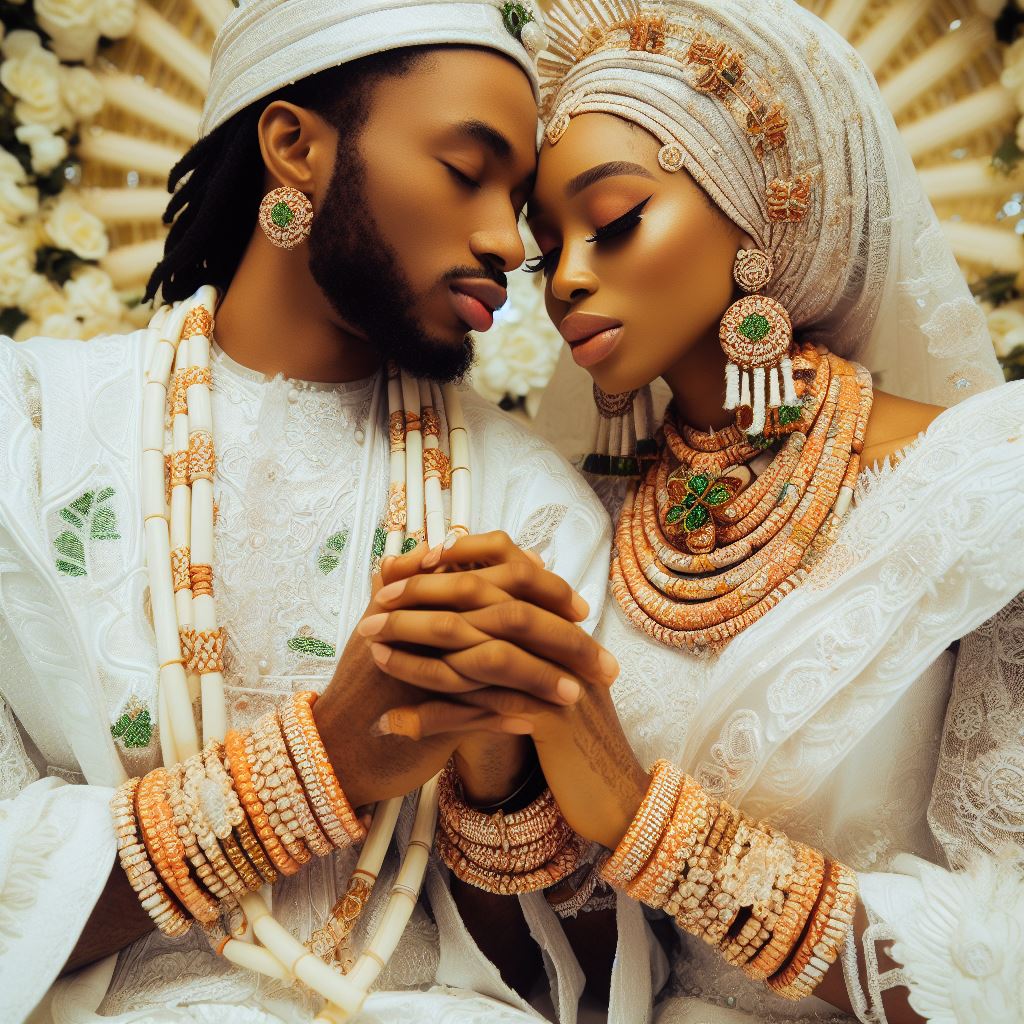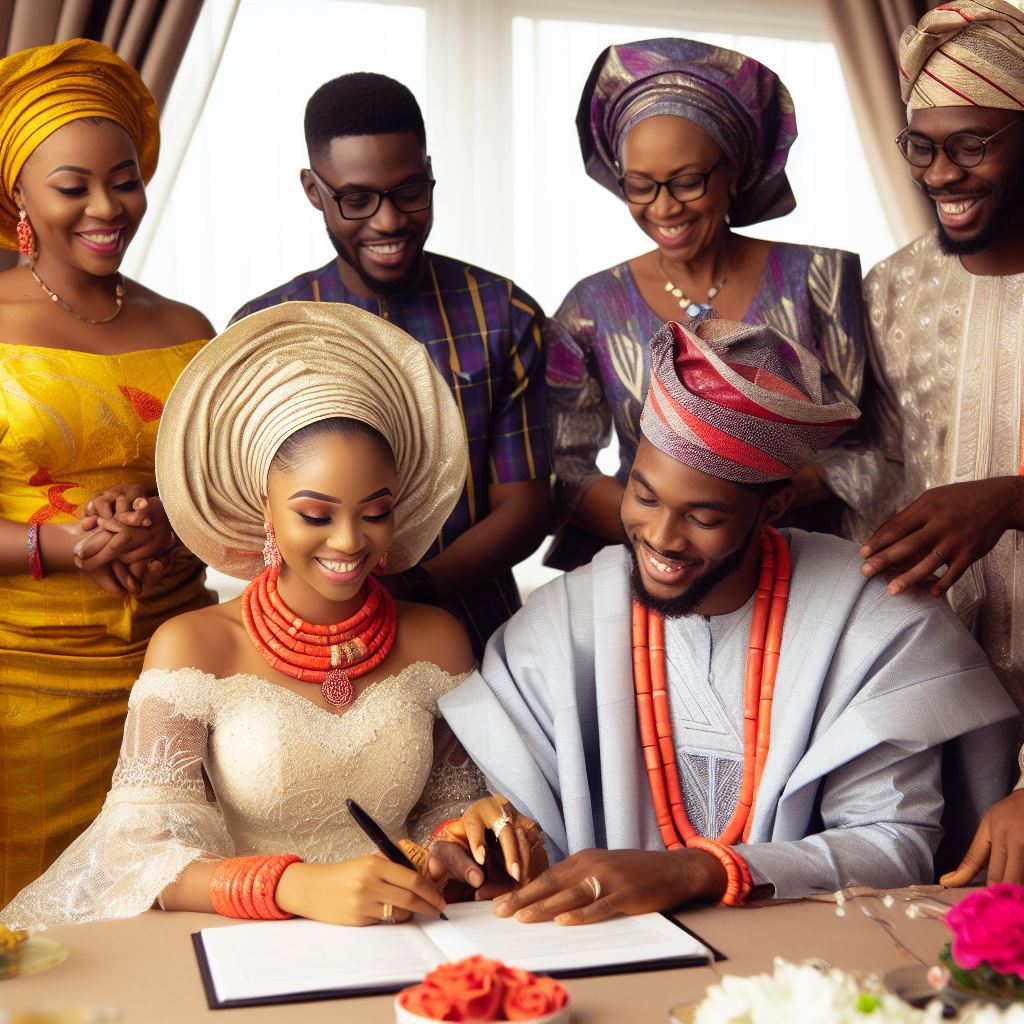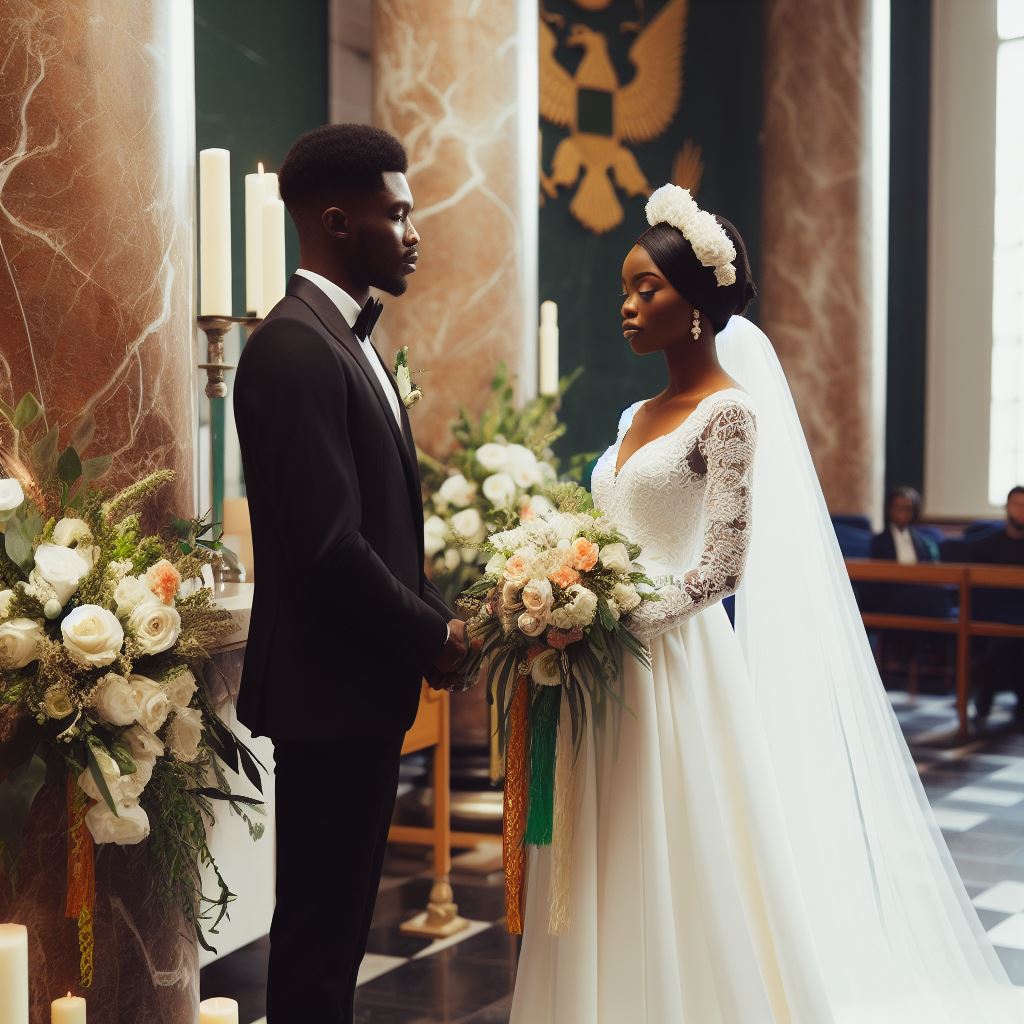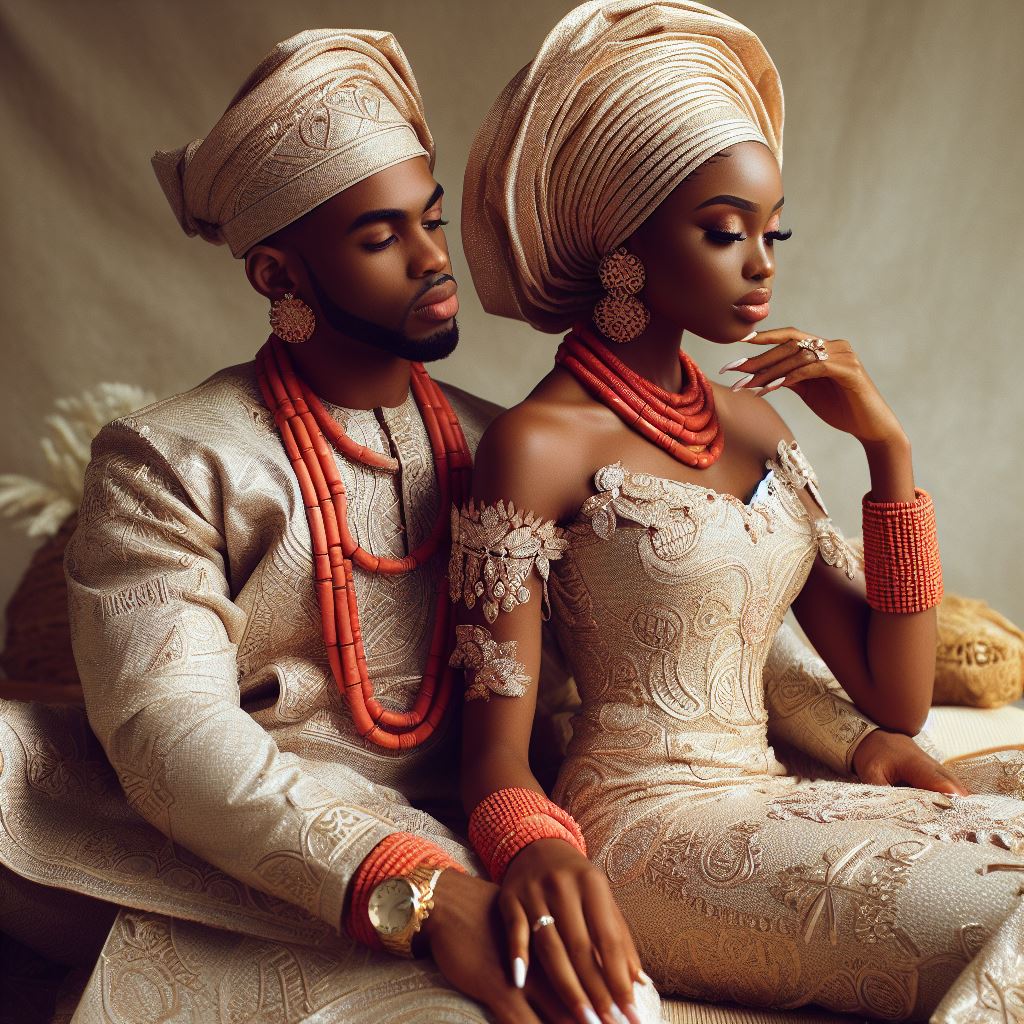Introduction
Wedding vows are promises exchanged between couples during their wedding ceremony, symbolizing their commitment.
Nigerian wedding traditions are rich in culture and involve various rituals and customs.
The purpose of this blog post is to compare foreign wedding vows with Nigerian wedding vows.
Wedding vows are an essential part of any marriage ceremony, serving as promises between couples.
These vows hold great importance as they represent the commitment and love shared between the bride and groom.
Nigerian wedding traditions are diverse and vibrant, with each ethnic group having its unique customs.
These traditions include traditional attire, rituals, and ceremonies that make Nigerian weddings distinct and memorable.
In this blog post, we will explore the differences between foreign wedding vows and Nigerian wedding vows.
By comparing these two cultural practices, we aim to shed light on the diverse ways couples express their love and commitment.
Foreign wedding vows often follow a traditional format, with couples reciting standardized phrases like “for better or for worse” and “in sickness and in health.”
These vows typically emphasize the lifelong commitment and the promise to support and cherish each other.
On the other hand, Nigerian wedding vows are more personalized and often involve the exchange of heartfelt promises specific to the couple.
These vows can be poetic, incorporating cultural elements and expressing deep emotions.
By examining these differences, we hope to gain a better understanding of the significance and beauty behind both foreign and Nigerian wedding vows.
Stay tuned for our upcoming sections, where we will delve deeper into specific aspects of these cultural ceremonies.
In fact, wedding vows play a vital role in expressing couples’ commitment and love.
This blog post aims to explore the cultural differences between foreign and Nigerian wedding vows, shedding light on the various ways couples celebrate their union.
Foreign Wedding Vows
Different countries’ wedding traditions and vows
1. Examples of Western wedding vows
In Western countries, wedding vows often include promises to love, honor, and cherish each other.
2. Examples of Asian wedding vows
Asian wedding vows may focus on familial duty, respect, and the joining of two families.
3. Examples of African wedding vows
African wedding vows may involve blessings from elders, recognition of community support, and the celebration of heritage.
Cultural influences on foreign wedding vows
1. Religious beliefs
Religious beliefs play a significant role in shaping foreign wedding vows.
Vows may incorporate customs specific to a particular faith.
2. Historical customs
Historical customs and traditions influence foreign wedding vows, reflecting the rich heritage and legacy of each culture.
3. Family and societal expectations
- Wedding vows vary across cultures, reflecting diverse traditions and customs.
- Western vows often emphasize love, honor, and cherish between the couple.
- Asian vows prioritize familial duty and maintaining family ties.
- African wedding vows celebrate heritage and community involvement.
- Religious beliefs shape the content and structure of vows.
- Historical customs connect couples to their cultural identity.
- Family and societal expectations influence vow selection.
- Extended family integration is vital in some cultures.
- Societal norms dictate the tone and content of vows.
- Foreign wedding vows offer insights into global cultural diversity, enriching our understanding and respect for different traditions.
Read: Cost of Marriage Counseling in Nigeria: Budgeting for Harmony
Nigerian Wedding Vows
Overview of typical Nigerian wedding ceremonies
In Nigeria, weddings are not just a union between two individuals but a celebration of culture, tradition, and unity.
There are two main types of wedding ceremonies observed in Nigeria.
Traditional weddings, also known as “Introduction,” are the foundation of Nigerian weddings.
This ceremony involves the formal introduction of both families, exchange of gifts, and a display of cultural rites and traditions.
It is an opportunity for the families to come together and solidify the bond between them.
Church weddings, commonly referred to as “White weddings,” are heavily influenced by Western traditions and are conducted in churches.
These weddings often follow a formal order of service, including hymns, prayers, and the exchange of vows and rings.
Nuptial vows in Nigerian wedding ceremonies
The role of religious leaders, such as pastors or priests, is significant in officiating the wedding vows.
They guide the couple through the process, provide spiritual counsel, and ensure the vows align with their religious beliefs.
During the vows exchange, couples have the option to recite traditional vows passed down through generations or create personalized vows expressing their love, commitment, and aspirations for their marriage.
Personalized vows allow couples to infuse their own personalities, experiences, and promises into the ceremony.
Nigerian wedding vows often incorporate traditional elements that hold deep cultural meaning.
These elements may include proverbs, blessings, prayers, and symbolic gestures like the breaking of kola nuts or pouring of libations.
By incorporating these elements, couples honor their heritage and showcase the richness of Nigerian culture.
Significance of Nigerian wedding vows in the culture
Nigerian wedding vows hold great significance in the culture as they symbolize more than just the commitment between two individuals.
They represent the merging of families, the continuation of traditions, and the building of community.
The vows carry profound symbolism and deeper meanings.
They signify the couple’s willingness to embark on a lifelong journey together, facing challenges and celebrating joys as a united front.
Through their vows, couples publicly declare their love, respect, and loyalty towards each other.
Family and community values are at the core of Nigerian wedding vows.
The vows emphasize the importance of family support, unity, and the role of extended family in the couple’s life.
They serve as a reminder that marriage extends beyond the couple, encompassing a broader network of love and support.
Nigerian wedding vows also reflect social and cultural expectations.
They often emphasize the respect for elders, the value of mutual understanding and compromise, and the commitment to upholding traditions and customs.
The vows serve as a testament to the couple’s dedication to upholding these expectations and ensuring the continuation of the Nigerian culture.
In short, Nigerian wedding vows are an integral part of the wedding ceremonies in Nigeria.
They not only represent the love and commitment between the couple but also serve as a beautiful reflection of the culture, traditions, and values held dearly by the Nigerian people.
Read: Understanding the Dynamics of Marriage Life in Nigeria
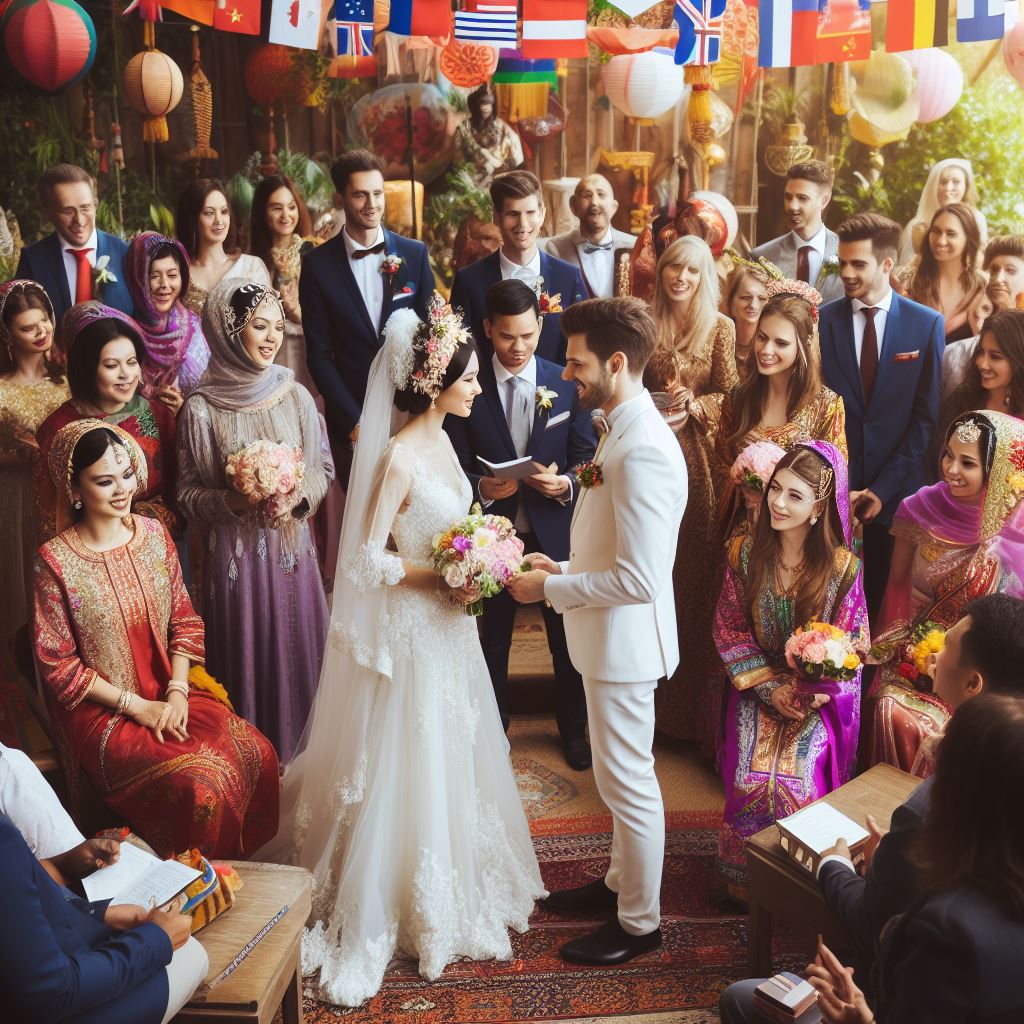
A Cultural Comparison: Foreign vs. Nigerian Vows
When it comes to wedding vows, whether in a foreign or Nigerian context, there are both similarities and differences that reflect the unique cultural backgrounds and individuality of the couple.
It is important to understand these nuances to appreciate the beauty and diversity of wedding traditions around the world.
Similarities between foreign and Nigerian vows
- Promises of love and commitment: Foreign and Nigerian wedding vows both emphasize the solemn promises between the couple to love and cherish each other throughout their lives.
The declaration of love and faithfulness is a foundational element in wedding ceremonies worldwide. - Expressions of lifelong partnership: In both foreign and Nigerian weddings, the vows often highlight the idea of a lifelong partnership, where the couple commits to standing by each other through thick and thin, in sickness and in health.
This signifies the depth of their bond and their intention to build a life together. - Vows to honor and support each other: Another common thread in foreign and Nigerian vows is the commitment to honor, respect, and support one another.
The vows often include promises to be there for each other, to uplift and encourage, and to be a steadfast source of emotional and physical support.
Differences between foreign and Nigerian vows
- Cultural context and individuality: One significant difference lies in the cultural context within which the vows are exchanged.
Foreign vows may be influenced by Western traditions, while Nigerian vows often reflect the rich cultural heritage and traditions of the country.
Additionally, the couple’s individual beliefs, values, and personalities shape the content and language of the vows. - Traditional vs. contemporary elements: Foreign wedding vows may incorporate contemporary elements, such as personal anecdotes, humor, or references to popular culture.
On the other hand, Nigerian vows often lean towards more traditional and poetic expressions, rooted in cultural symbolism and proverbs that have been passed down through generations. - Influence of family and community dynamics: Nigerian wedding vows often take into account the importance of family and community dynamics.
The couple may make promises to respect and honor their parents, elders, and community leaders.
This reflects the communal nature of Nigerian society, where the union of two individuals involves the blessing and support of the wider community.
In essence, while there are shared values and commitments in wedding vows across different cultures, the differences in cultural context, individuality, and the influence of family and community dynamics give each set of vows its unique flavor.
Whether foreign or Nigerian, wedding vows serve as a beautiful reflection of love, commitment, and the celebration of a union that transcends borders and cultures.
Read: Balancing Tradition & Modernity: Nigerian Nuptials Explored
Impact and Significance of Foreign vs. Nigerian Vows
Reflection on personal choices and cultural identity
- Choosing between foreign and Nigerian vows allows individuals to reflect on their cultural identity.
- Foreign vows may provide an opportunity for individuals to explore different cultural traditions.
- Nigerian vows reflect a deep connection to one’s roots and cultural heritage.
- The choice of vows can shape an individual’s sense of self and personal values.
- It enables individuals to express their allegiance and pride in their cultural background.
Effect on the couple’s relationship and marital expectations
- The choice of vows can impact the couple’s relationship dynamics and expectations.
- Foreign vows may bring about new perspectives and values, which can enrich the relationship.
- Nigerian vows reinforce shared cultural values and traditions between the couple.
- The expectations associated with foreign vows might lead to open-mindedness and adaptability.
- Nigerian vows emphasize commitment to family, community, and traditional roles within the marriage.
Influence on family and community perception and support
- The choice of vows can influence how family and the community perceive and support the union.
- Foreign vows might be seen as a symbol of modernity and international exposure by the family.
- Nigerian vows may be viewed as a reinforcement of cultural pride, garnering strong community support.
- The support and understanding from family and the community can positively impact the couple’s relationship.
- The perception of the vows by family and the community can shape social interactions and acceptance.
Long-term implications for intercultural relationships
- The choice of vows has long-term implications for intercultural relationships.
- Foreign vows may allow for a blend of different cultural practices, fostering cultural appreciation.
- The commitment to Nigerian vows strengthens cultural preservation and the passing down of traditions.
- Intercultural relationships may face unique challenges that require understanding and compromise.
- The choice of vows sets a foundation for intercultural understanding and mutual respect within the relationship.
In review, the impact and significance of foreign versus Nigerian vows reach beyond the wedding ceremony.
The choice of vows reflects personal choices and cultural identity, affecting the couple’s relationship dynamics and expectations.
Furthermore, it can influence family and community perception and support, as well as present long-term implications for intercultural relationships.
The decision between foreign and Nigerian vows is a deeply personal one that carries tremendous cultural weight and personal meaning.
Read: Communication Breakdown: Solutions for Nigerian Couples
Conclusion
Recap the key points discussed in the blog post
Throughout this exploration of foreign and Nigerian wedding vows, we’ve uncovered several intriguing facets of these sacred promises.
From the heartfelt sentiments expressed in Western vows to the rich cultural diversity in Nigerian ceremonies, we’ve seen how love is celebrated in its various forms across the world.
As we conclude, it’s important to remember that love knows no borders.
Embracing cultural diversity, be it in wedding vows or any other aspect of life, enriches our understanding of the world and brings us closer together.
Let’s celebrate our differences and cherish the unique beauty of each culture’s wedding traditions.
Reminder of the significance of wedding vows in any cultural context
In every culture, wedding vows hold immense significance.
They are the promises that bind two souls together, transcending languages and borders.
No matter how they are spoken, wedding vows are a testament to the power of love and commitment.

